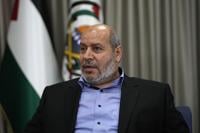The Palestinian militant group Hamas has said for more than 15 years that it could accept a two-state compromise with Israel — at least, a temporary one. But Hamas has also refused to say that it would recognize Israel or renounce its armed fight against it.
For Israel and many others, especially in the wake of in Gaza, that’s proof that Hamas is still irrevocably bent on destroying Israel. The United States and European countries have joined Israel in shunning the militant group they have labeled a terrorist organization.
For some observers, Hamas has signaled a potential pragmatism that could open a path to a solution. But the group’s vagueness as it tries to square the circle of its own positions has fueled suspicion.
Hamas offers long-term “truces” instead of outright peace. It has dropped open pledges to destroy Israel but endorses “armed resistance” — and says it will fight for liberation of all “the land of Palestine.”
In the latest iteration of its stance, senior Hamas official Khalil al-Hayya told The Associated Press in an interview on Wednesday the group would if an independent Palestinian state is established in the West Bank and the Gaza Strip along the pre-1967-borders.
Though he again spoke of a truce, it was also a rare suggestion that Hamas could dissolve its armed wing.
Israeli Prime Minister Benjamin Netanyahu has vowed to destroy Hamas after the militants’ Oct. 7 attack on southern Israel. Netanyahu has repeatedly rejected the creation of a Palestinian state and, critics say, worked to severely undermine the West Bank-based Palestinian Authority that has recognized Israel.
Here’s a look at some of the nuances in Hamas’ positions, in the past and now:
UNITY TALKS
In 2006, after Hamas won Palestinian legislative elections, it entered talks with Palestinian Authority over a unity government. Amid the negotiations, — said the group supported a Palestinian state along the 1967 lines “at this stage, but in return for a cease-fire, not recognition.”
The two sides eventually reached a deal under which the unity government, including Hamas, would “respect” the Palestinian Authority’s peace agreements with Israel. It was a formula that allowed Hamas to avoid accepting the accords and recognizing Israel.
Israel and the U.S. refused to recognize the unity government and imposed economic sanctions. The government quickly collapsed amid fighting between Hamas and Abbas’ Fatah faction — ending with Hamas' 2007 takeover of Gaza.
In 2008, then-political head of Hamas Khaled Mashaal said it would accept a state in the West Bank and Gaza along with a 10-year truce with Israel. He rejected ever recognizing Israel, but he suggested Hamas would accede to a permanent peace accord with Israel if Palestinians accepted one in a referendum.
Hamas and Abbas’ PA have had multiple rounds of unity talks ever since, often emerging with variations in phrasing on Hamas’ stance. Every time, unity efforts have been wrecked by the factions’ own bitter rivalry over power and the West's refusal to accept any government that includes Hamas unless it expressly recognizes Israel.
THE NEW 2017 ‘CHARTER’
After years of internal discussions, Hamas came out with a new political platform in 2017 that presented a dramatic change in tone from its original charter, issued in 1988.
The 1988 charter presented the Israeli-Palestinian conflict in stark religious terms. It spoke of “our struggle against the Jews,” insisted the land belonged to Muslims and declared that jihad, or holy war, was the only way to solve the Palestinian question.
The 2017 document dropped much of that religious and antisemitic rhetoric and instead presented its cause in terms of human rights, including the right of refugees to return and the right to resist occupation. It said its fight wasn’t against Jews but against Zionism, which it called a “colonial” project that had taken Palestinians’ land and repressed their freedoms.
The document enshrined Hamas’s quasi-acceptance of a state in the West Bank and Gaza Strip. It said such a state, with Jerusalem as its capital and the return of Palestinian refugees, was a “national consensus.”
Still, it said it rejects “any alternative to the full and complete liberation of Palestine, from the river to the sea.” That area includes what is now Israel, and in the context of Hamas' agenda, such language is seen by Israel as a call for its destruction.
___
Follow AP’s war coverage at








































